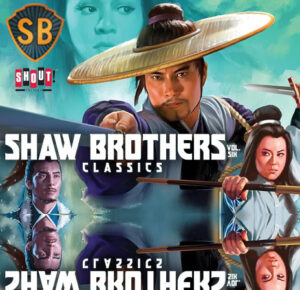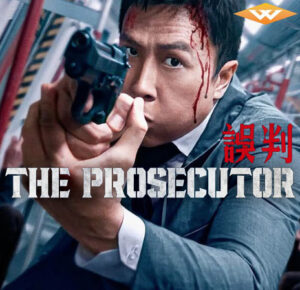
“Undeclared War” Chinese DVD Cover
Director: Ringo Lam
Cast: Danny Lee Sau Yin, Tommy Wong Kwong Leung, Peter Liapis, Vernon Wells, Olivia Hussey, Rosamund Kwan, Louis Roth, Dean Harrington, Victor Hon Kwan, Mars, Jonathan Isgar, Brad Kerner, Mark King, Jameson Lam
Running Time: 103 min.
By Paul Bramhall
In 1990 it seemed Ringo Lam could do no wrong. Having established himself as a director of realistic and gritty action thrillers with his …on Fire series (City on Fire and Prison on Fire were both released in 1987, followed by School on Fire in 1988), the production company Cinema City decided to put their money where their mouth is. Armed with a sizable budget, Lam was tasked with helming the action movie Undeclared War, with the intention of breaking the international market.
Shot almost entirely in English, on release the movie tanked both critically and financially. Much like Kirk Wong’s Taking Manhattan made a couple of years later, it seemed Hong Kong audiences simply weren’t ready to go and watch a local movie where they’d have to read subtitles, and the result was a box office bomb. Internationally it didn’t fare any better. Up against action flicks like Die Hard 2, what was considered a big budget production in Hong Kong still didn’t stand a chance when compared alongside Hollywood blockbusters in the same vein.
The result was Undeclared War quickly became forgotten, destined to become an entry in Lam’s filmography that would either be overlooked or glazed over whenever discussing his work. Watching the movie 25 years on from when it was first released though, it’s fair to say that there’s a lot to enjoy. The grittiness that Lam had become known for is arguably present and accounted for, while the flair for action that he’d cement with Full Contact in 1992, is here clearly a work in progress, but still solid nevertheless.
Despite having a cast which has many central characters played by gweilos, a fact which hardly inspires confidence from a 1990 Hong Kong movie, surprisingly all involved turn in serviceable performances. Beginning in Warsaw, a CIA agent played by Peter Lapis witnesses the brutal murder of the U.S. ambassador, including his wife and child, at the hands of a terrorist played by Vernon Wells. Many will probably recognize Wells as the apocalyptic gang leader pursuing Mel Gibson from Mad Max 2: The Road Warrior. The Australian actor also famously played Bennett, the memorable villain from the Arnold Schwarzenegger vehicle Commando. After tracking Wells to Hong Kong, Lapis is reigned in by the local law enforcement, played by Danny Lee, of The Killer and Tiger on the Beat 2 fame (which was made the same year). Eventually of course, Lapis and Lee end up putting aside their differences and team up to take Wells down.
There are plenty of other familiar faces in the mix as well, from Rosamund Kwan, playing a news reporter and Lee’s girlfriend, to Mars, here in a rare bad guy role playing one of Wells’ lackeys. It’s a mix that almost certainly shouldn’t come together, but perhaps due to having a talent like Lam in the directors chair, and a script that avoids being hokey, Undeclared War succeeds at being a tight little action flick. It may not be the big budget effort it was aiming to be, but with expectations lowered, it’s definitely a unique entry into the genre and keeps up a brisk pace throughout.
The script was penned by multiple writers, and amongst them is Louis Roth, who is probably the reason why the English lines hold together so well. Roth is one of those actors who’s in the background of so many Hong Kong movies of the era, perhaps most famously as the customer on the receiving end of Chow Yun Fat’s “You don’t like my rice!?” line from A Better Tomorrow 2. Here he also takes on the role of a character vital to the plot, however I’m sure his biggest contribution, considering what many English language exchanges are like in HK movies of the era, must be his work on the dialogue. Both Danny Lee and Rosamund Kwan’s lines are almost all in English, and they deliver them with aplomb, with no unintentional moments of humor in sight.
For fans of Hong Kong action and Lam’s realistically gritty style of film making, both are present and accounted for, although perhaps in a different way than audiences at the time were hoping for. The assassination of the U.S. ambassador takes place before the movies title has even appeared on screen, and throws in machine gun totting nuns, explosions, and a helicopter for good measure. The type of blood squib in use also has a unique look to it, similar to the style used in Johnnie To movies like Exiled, when someone gets shot a cloud of red mist erupts from the victim. It’s just as unrealistic as the gallons of blood erupting from a gun shot wound, but it’s definitely visually arresting, and gives the violence a different feel from many movies of the same elk.
Lapis also shows a welcome abandon in his action scenes, seemingly not afraid to get thrown around and take some falls. An exciting foot chase that has him in pursuit of Wells ultimately ends up in a confrontation with Mars, which has them falling down stairs and going at each other on a bridge with anything they can get their hands on. Another scene has him get into a fight with Lee, which sees the both of them scrapping it out in a brawl on the street that doesn’t pull any punches. In many ways it’s Lapis’ lack of gracefulness which makes the action more exciting, as it makes it more relatable, especially in a speed boat chase sequence were you can see he’s visibly clinging on for dear life.
The fact that Lee and Lapis spend almost half of the movie locking heads with each other also makes the respect that eventually forms between them seem more believable. They both bring a down to earth type quality to their characters, and by the time they team up, a lot of their banter is genuinely funny and believable. What’s especially refreshing about Undeclared War is the way Lapis is the butt of many HK situational jokes. In an era where we’ve seen Jackie Chan play the fish-out-of-water in an endless stream of Hollywood movies, whether it be paired with Chris Rock, Owen Wilson, or whoever else, it’s nice to see a movie that puts the shoe on the other foot. Lee is the one calling the shots as the Hong Kong local, and Lapis is the American on foreign soil who has to try and fit in, and it remains that way throughout.
In fact the whole movie does well to play off the tensions between the local HK police force, the British authorities in charge, and the American CIA trying to call the shots. The political subtexts and character relationships aside though, Undeclared War was made as an action flick, and on that basis it delivers. During its 103 minute run time there should be enough gun shots, grenades, explosions, and chase sequences to keep any fan of Hong Kong cinema happy. It may not be Ringo Lam’s best work, and there are a couple of glaring plot holes (look out for Lee getting shot in the arm, then in the next scene miraculously seeming to be completely fine!), but for a slice of HK action from the territories golden era, you can do a lot worse.
Paul Bramhall’s Rating: 7/10























Be the 1st to Comment